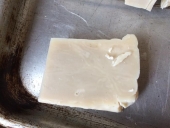
 12
12




 ). These are two really great companies with high quality ingredients that I have purchased from myself. I was very happy with all their stuff. Jedwards International and Essential Wholesale.
). These are two really great companies with high quality ingredients that I have purchased from myself. I was very happy with all their stuff. Jedwards International and Essential Wholesale.
 5
5




when you're going through hell, keep going!

 2
2




Meg Mitchell wrote:IMO the absolute best resource for a beginning soapmaker is Smart Soapmaking by Anne Watson. A lot of soapmaking resources are cargo-culting based on things other soapmakers have said in the past, but Anne bases her work on experience and dispels a lot of common myths in the book. To use a totally random analogy, I'd say she's the Sam Thayer of soap. She even has another book about how to make Castile soap that isn't gross (which I haven't tried yet, but she does explain why Castile soap tends to be so gross and yet such a classic of at-home soapmaking).
I'm not a huge fan of Soap Queen because they use a lot of unnecessary tools and artificial ingredients (they make their $ selling materials and tools, so their recipes tend to use way more than is needed to turn out a good result), and there's been more than one video from them where they insult the viewer's intelligence. I'm a STEM nerd and it annoys me beyond belief to have some woman assure me that it's okay that I'm too dumb to do basic math and chemistry.
 Please note that is only my opinion because I do not like glitter. If you are a fan of glitter, have at it.
Please note that is only my opinion because I do not like glitter. If you are a fan of glitter, have at it. 
 1
1




Meg Mitchell wrote:IMO the absolute best resource for a beginning soapmaker is Smart Soapmaking by Anne Watson. A lot of soapmaking resources are cargo-culting based on things other soapmakers have said in the past, but Anne bases her work on experience and dispels a lot of common myths in the book. To use a totally random analogy, I'd say she's the Sam Thayer of soap. She even has another book about how to make Castile soap that isn't gross (which I haven't tried yet, but she does explain why Castile soap tends to be so gross and yet such a classic of at-home soapmaking).





 3
3




Sometimes the answer is nothing





Deb Stephens wrote:I also don't consider using melt-and-pour products to be true soapmaking since they are already made into bars of soap that can be used as-is if desired. None of the processes of soapmaking are involved when doing melt-and-pour soaps--they are merely melted on the stove or in the microwave and poured into molds to re-set.
 Seems pretty logical to me that you're not making soap here, just modifying it. If you're not working with lye, you probably haven't made soap.
Seems pretty logical to me that you're not making soap here, just modifying it. If you're not working with lye, you probably haven't made soap.
Deb Stephens wrote:By the way, what have you got against Castille soap? A well-made bar is really the best for making a quick version of homemade laundry soap. I grind my bars and remelt them as the base for my laundry soap (with borax and washing soda added). It works great and is a real timesaver when I don't feel like doing the whole hot-process liquid laundry soap. Personally, I find them too drying for regular use on skin, but they do make for a good cleansing bar.
when you're going through hell, keep going!





 2
2




"Do the best you can in the place where you are, and be kind." - Scott Nearing
 1
1





|
Obey! Obey this tiny ad!
Learn Permaculture through a little hard work
https://wheaton-labs.com/bootcamp
|




